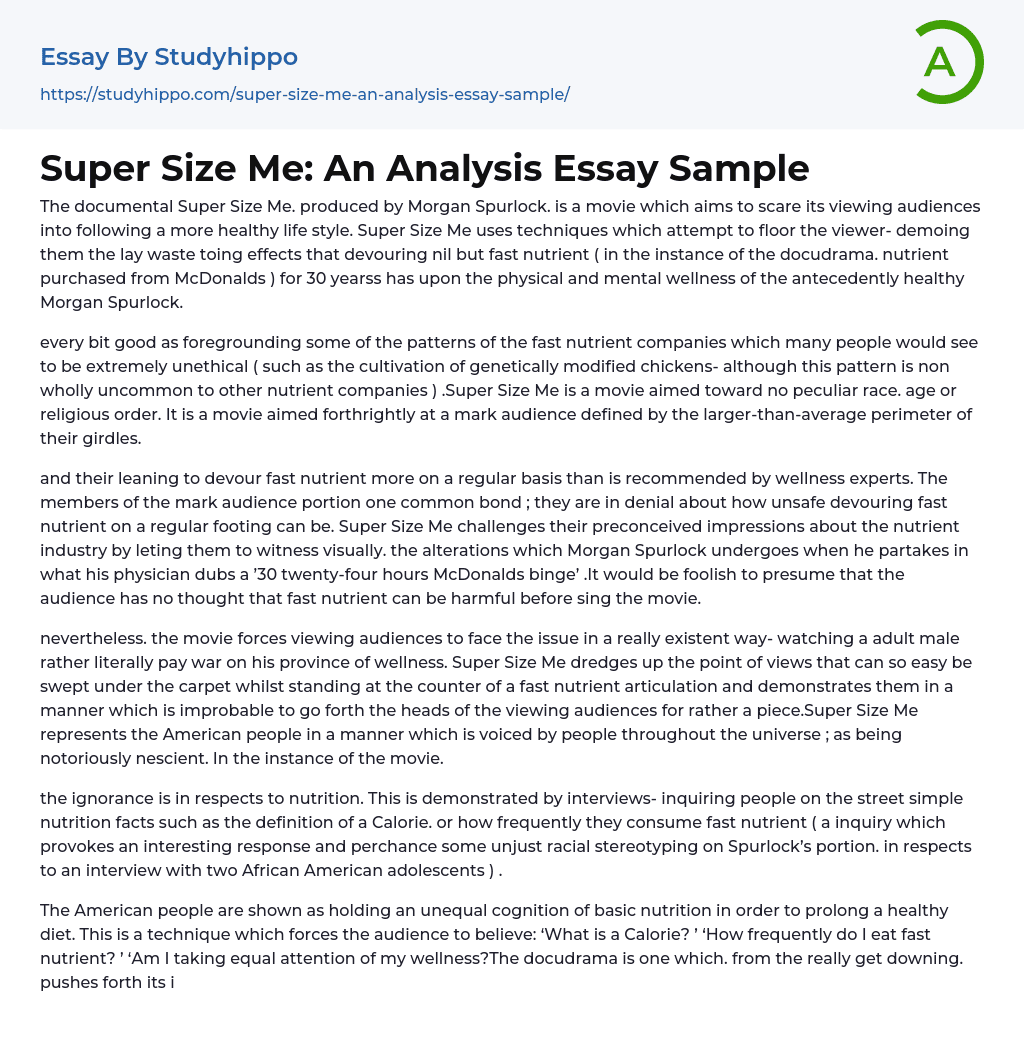The film Super Size Me, created by Morgan Spurlock, seeks to frighten viewers into adopting a healthier lifestyle. Through powerful techniques, the documentary illustrates the damaging consequences of consuming only fast food (specifically McDonald's) for 30 days on the previously healthy physical and mental wellness of Morgan Spurlock.
The following paragraph highlights the unethical practices of fast food companies, including the cultivation of genetically modified chickens, as depicted in the documentary film Super Size Me. The film is intended for a specific audience defined by their larger-than-average waistlines and does not target any particular race, age, or religious group. The text should retain all present in the original.
The target audience shares a common tendency to consume fast food more frequently than recommended by health professionals, despite the po
...tential dangers. However, Super Size Me aims to challenge their pre-existing beliefs about the food industry by visually depicting the changes that Morgan Spurlock undergoes during his "30-day McDonald's binge", as labeled by his doctor. While it would be unreasonable to assume that the audience is unaware of the harmful effects of fast food prior to viewing the movie, the documentary serves to highlight these consequences and encourage a reconsideration of their eating habits.
Despite this, Super Size Me presents a stark depiction of a man battling his own health, forcing viewers to face the issue in a very real way. The film raises perspectives that are often ignored when standing at the counter of a fast food joint and portrays them in a way that is unlikely to be forgotten. Representing the American people as notoriously ignorant, Super Size Me speaks to a sentiment shared b
people around the world.
It is evident from street interviews that there is a lack of knowledge regarding nutrition, as demonstrated by questions about basic nutritional information like what a calorie is and how often fast food is consumed. These interviews may also lead to unfair racial stereotyping, as seen in an interview with two African American teenagers conducted by Spurlock.
From the outset, the documentary immediately enforces its purpose by portraying the unequal understanding of basic nutrition among Americans, emphasizing the importance of sustaining a healthy diet. The audience is prompted to question their knowledge regarding calories, the frequency of consuming fast food and whether they are sufficiently taking care of their health.
Throughout his 30-day experiment, viewers are aware that Morgan Spurlock's health will decline according to his perspective. However, the degree to which his health deteriorates is startling.
In the first five years of the experiment, Spurlock gaining 10 pounds is perhaps the most significant and alarming aspect for those fixated on fad diets in America. Despite the fact that the excessive intake of calories is the driver of weight gain, McDonald's food is now intimately associated with weight gain in the minds of viewers. The message projected is that if you eat McDonald's, you will gain weight. Spurlock advocates for a campaign that portrays fast food companies as something resembling monsters. Although it is easy to agree with him that these companies rely on obtrusive advertising to manipulate us into purchasing their food and engage in practices that can be deemed "unethical."
Disagreeing with him on nutrition terms is simple. McDonald's food is not inherently 'bad' - no food is. It is the frequency of
consumption and portion sizes that make this food harmful. Spurlock highlights this fact by mentioning how the 'small' size French fries used to be the only size available.
Despite any rare instances, it cannot be denied that the movie portrays McDonalds as nutritionally bad. The visual codes used in the movie mimic those used by fast food companies, incorporating bright, flashy colors, particularly red and yellow, which studies have shown can stimulate hunger.
The film's satirical commentary on fast food advertising techniques is highlighted by its garish visuals. A graphic depiction of liposuction is included, featuring unsettling views of the human body that could discourage viewers from consuming unhealthy food. Super Size Me follows typical documentary conventions, with filmmaker Morgan Spurlock serving as a witty and engaging narrator who offers commentary and rhetoric throughout the movie.
The documentary incorporates archival footage and interviews with various individuals, including Don Gorske, a Big Mac enthusiast, to showcase the sketches and commercials produced by McDonalds. Additionally, some scenes are presented using shaky camera footage to enhance the perception of realism.
Super Size Me is a film that encourages people to adopt healthier lifestyles by avoiding fast food and not supporting the fast food industry that profits millions at the expense of their customers' health. The movie employs an extreme experiment to illustrate Morgan Spurlock's perspective. (Supersize Me. Morgan Spurlock. 2006)
- Food essays
- Genetically Modified Organisms essays
- Child Development essays
- Eating essays
- Breakfast essays
- Genetically Modified Food essays
- Milk essays
- Chewing gum essays
- Energy Drink essays
- Caffeine essays
- Chocolate essays
- vegetarian essays
- Weight Loss essays
- Anorexia essays
- Metabolism essays
- Diet essays
- Vitamin essays
- Dieting essays
- Junk Food essays
- Eating Habits essays
- Food Safety essays
- Food Security essays
- Beverages essays
- Cuisines essays
- Dairy essays
- Desserts essays
- Fast Food essays
- Bread essays
- Meal essays
- Meat essays
- Organic Food essays
- Rice essays
- Sugar essays
- Taste essays
- Beef essays
- Coconut essays
- Crowd essays
- Dinner essays
- Juice essays
- Sainsbury essays
- Cooking essays
- Ginger essays
- Oreo essays
- Drink essays
- Beer essays
- Wine essays
- Coffee essays
- Tea essays
- Cake essays
- Hamburger essays




